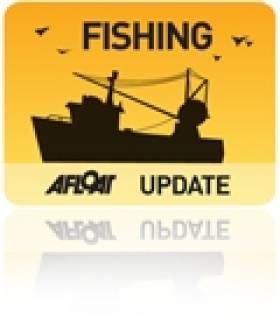Displaying items by tag: pelagic
State Aid Approval for €25.6m Liquidity Aid Scheme for the Pelagic Segment of the Irish Fishing Fleet
Marine Minister Charlie McConalogue has announced a €25.6 million support package for the Irish pelagic fisheries sector.
The Pelagic Fisheries Support Scheme, funded under the Brexit Adjustment Reserve Fund, will compensate owners of Refrigerated Sea Water (RSW) pelagic vessels and polyvalent Tier 1 and Tier 2 vessels that have suffered losses of mackerel quota over the period 2021-2023 as a result of the quota transfers to the EU under Brexit.
The support is designed to stabilise cash flow and assist vessel owners to re-structure their operations in light of the loss of earnings associated with the reduction of available quota under the TCA. The short-term aid is essential financial support to allow the 23 RSW vessels and the 27 polyvalent Tier 1 and Tier 2 vessels sufficient time to put in place longer-term restructuring measures.
Minister McConalogue said: “This €25.6 million support for the RSW pelagic fleet segment recognises the impact of quota transfers to the UK from the EU under the Trade and Cooperation Agreement (TCA), and in particular that this segment of the Irish fleet has suffered the largest TCA related quota reductions for the main target species of mackerel.”
The Pelagic Fisheries Support Scheme was one of the recommendations of the Seafood Taskforce appointed by the Minister. It is restricted to eligible vessels in the RSW pelagic segment and Polyvalent Tier 1 and Tier 2 vessels fishing for mackerel in 2021 and 2022. Payments under the scheme represent the value of reduced fishing opportunities that resulted from the actual loss of mackerel quota in 2021 and 2022 arising from the quota transfer of quota to the UK. In monetary terms, the loss of mackerel per vessel over the same period, equates to the loss of one month’s fishing opportunities per year, with payment calculated on the average monthly turnover per vessel, less cost of fuel and provisions, over the period 2018-2020, compensating for one month per annum for 2021 and 2022.
The Minister concluded: “The RSW pelagic fleet segment has suffered significant quota loss of some 20,130 tonnes worth approximately €27.3 million, and this much-needed support will go some way to supporting the segment to adjust to the changed situation we find ourselves in so as to ensure a profitable and sustainable fishing fleet into the future. Now that I have secured State Aid approval from the EU Commission, I will instruct BIM to administer this scheme without delay.”
Scheme information, once launched, will be available on BIMs website at BIM - The Brexit Adjustment Reserve Fund
#fisheries – The Sea-Fisheries Protection Authority (SFPA) will host a seminar entitled Pelagic Fisheries – Monitoring, Control and Surveillance from today, Tuesday 19th June to Thursday 21st June at their head office in Clonakilty. The seminar will include delegates from: the Norwegian Fisheries Directorate; the Irish Naval Service; the Marine Institute; Marine Scotland, the Scottish Control authorities; the National Bureau of Criminal investigation (NBCI); representatives from the Irish pelagic industry as well as the SFPA. The key objective of the seminar is to share information and best practice in terms of verifying compliance of pelagic fisheries at sea.
The first session takes place today, Tuesday 19th June and will involve a number of presentations including; an overview of Norway's and Ireland's fisheries control procedures; the fisherman's perspective on compliance and control; pelagic stocks and fisheries in the North East Atlantic from a scientific perspective and the origins, role and purpose of the EU/Norway Pelagic Technical Working Group.
On the second day the focus will be on best practices in fisheries control at sea and on landing. There will also be a discussion on lessons learnt from previous enforcement actions both in Ireland and Scotland.
The final day will involve a perspective of an industry group who have harnessed the benefit of compliance to achieve external accreditation of their fishery and associated labelling of their product. Following this, the seminar will focus on developing agreed action points and steps to implementation.
Andrew Kinneen, Board member with the SFPA said: "This seminar will provide an excellent opportunity for key representatives from Norway, Scotland and Ireland to share valuable information on how best to monitor the legal exploitation of pelagic fisheries around the coasts of Ireland. The SFPA wants to play our part in protecting the rich resources of mackerel, herring and other pelagic fish around the coasts of Ireland for the benefit of responsible fishermen. We need to ensure we have the best systems in place so that illegal practices such as high-grading are prevented. The effective monitoring and control of these pelagic fish stocks requires the close co-operation of Ireland with other Member States and with Norway. I am sure this seminar will help promote a level playing field of best practice amongst the participants. We look forward to a fruitful exchange of information and ideas on how we can best work together to protect the interests of legitimate fishermen.
The Irish seafood industry is vitally important to our economy - total sales of Irish seafood on both domestic and export markets, excluding direct landings for Irish vessels into foreign ports, amounted to €730 million in 2008 which represented 345,000 tonnes. Exports of Irish seafood for 2010 are estimated at €365 million. An estimated 75% of Irish seafood exports are sold in EU markets - markets outside of the EU are also of vital importance notably for Ireland's pelagic fleet which fishes mainly mackerel, horse mackerel, herring and blue whiting. Nigeria and Russia are among the main markets for these species. This seminar will seek to underline that good goverance overall and co-ordinated monitoring effort between Ireland and other countries is the way forward to safeguarding jobs and securing a profitable future for Ireland's fish catching and processing sectors."






























































